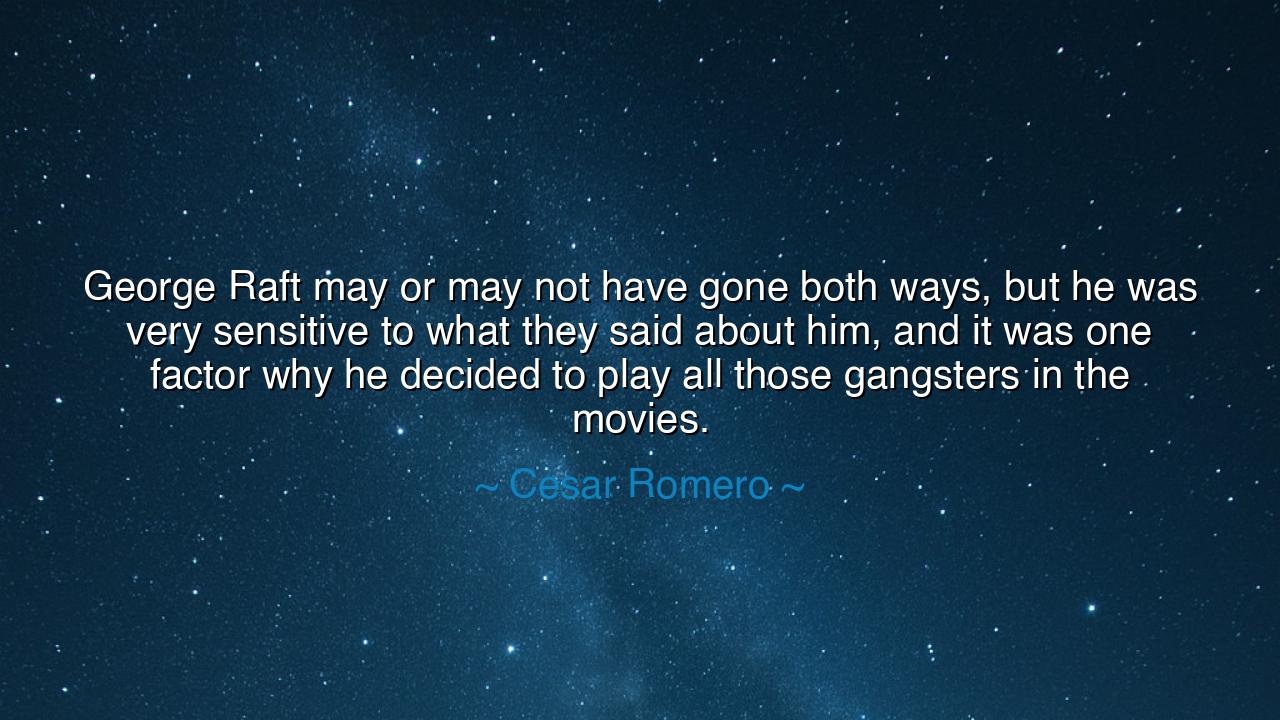
George Raft may or may not have gone both ways, but he was very
George Raft may or may not have gone both ways, but he was very sensitive to what they said about him, and it was one factor why he decided to play all those gangsters in the movies.






Come closer, children, and listen, for the words of those who walked the narrow paths of fame often carry deeper lessons about the human spirit. Cesar Romero, an actor who himself knew the trials of the public eye, once spoke of George Raft, a fellow actor, saying: "George Raft may or may not have gone both ways, but he was very sensitive to what they said about him, and it was one factor why he decided to play all those gangsters in the movies." These words, filled with subtle truth, reveal much about the fragility of identity and the power of perception—how the world’s judgment can shape the choices of a person, even one as strong as Raft, and how sensitivity to public opinion can drive us toward paths that might not have been our first choice.
In the ancient world, the heroes and gods were often shaped by the way others saw them. Achilles, the great Greek warrior, was driven by honor and a desire for glory, but his fame—his very reputation—was a double-edged sword. Though admired, his fame also brought him criticism and envy from those around him. The Greeks understood that reputation—the way one is seen by others—can influence a person’s choices, often more than they would like to admit. Similarly, Raft’s decision to portray gangsters may have been a reflection of his own desire to shape his identity in a way that protected him from the whispers of society. The roles he chose might have been a way to wrest control over his public image, to align himself with a character who could appear strong, untouchable, and, perhaps, even immune to judgment.
The story of Heracles (Hercules) offers another example of how identity is influenced by the opinions of others. Heracles, born of a union between Zeus and the mortal Alcmene, was a figure of immense strength and courage, yet his labors were driven in part by a need to prove himself, to show the world his worth after being wronged by Hera. The twelve labors were not just acts of heroism—they were attempts to restore his reputation, to prove he was not a mere victim of divine jealousy. Raft’s choice to take on roles that reflected strength and dominance, in the form of gangsters, speaks to this same need to shape identity in response to public judgment. When society dictates your worth, the soul often reacts by overcompensating, trying to portray an image that fits the narrative others have imposed upon you.
Romero’s words remind us that in a world of constant judgment, even the most powerful figures are vulnerable to the whispers of the crowd. We all carry within us the tension between how we wish to be seen and how others see us. Raft, in his portrayal of gangsters, may have felt the need to assert his own dominance and strength in response to being misunderstood or labeled by others. The same tension exists in our own lives: the struggle between the identity we wish to project and the one the world insists upon. The gangster roles may have been a shield, a way for Raft to protect himself from the more personal and perhaps painful criticisms that came with his public life.
In the story of Cyrus the Great, the founder of the Persian Empire, we see a similar reflection of how one’s image can shape one’s actions. Cyrus, though a conqueror and ruler, was deeply attuned to the perceptions of his subjects and enemies alike. He built his empire not just through military strength but through diplomacy and the ability to craft an image of benevolence. Like Raft, Cyrus understood the power of perception—how the world’s view of you could influence your success or failure. Raft’s sensitivity to how he was perceived could be seen as a mirror to this ancient truth: identity is often shaped not by our true selves, but by the stories others tell about us.
The lesson, children, is that we must be aware of the powerful influence that external judgment has on our lives. It is not always easy to walk in the light of our true selves when the world around us pushes us to wear masks and play roles. Yet, just as Raft chose to embody the gangster figure to assert control over his identity, we too must sometimes choose the path we wish to walk—without letting the opinions of others entirely define us. We must strive for self-awareness—to know when we are making choices because we genuinely desire them, and when we are simply reacting to the pressures around us.
Children, let this be your guiding principle: do not let the opinions of others trap you in roles you do not wish to play. Choose your path with awareness, with courage, and with the knowledge that your true self is not bound by the labels others place upon you. Just as the ancient heroes overcame the limitations of their public image, so too can you find strength in owning your own narrative, shaping it not in response to judgment, but in alignment with your own truth. Let your identity be as much a creation of your own will as it is shaped by the world around you.






AAdministratorAdministrator
Welcome, honored guests. Please leave a comment, we will respond soon